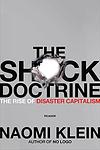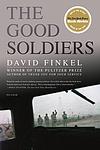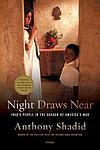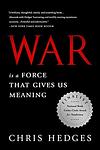The Greatest "Nonfiction, Iraq" Books of All Time
Click to learn how this list is calculated.
This list represents a comprehensive and trusted collection of the greatest books. Developed through a specialized algorithm, it brings together 300 'best of' book lists to form a definitive guide to the world's most acclaimed books. For those interested in how these books are chosen, additional details can be found on the rankings page.
Genres
Countries
Date Range
Reading Statistics
Click the button below to see how many of these books you've read!
Download
If you're interested in downloading this list as a CSV file for use in a spreadsheet application, you can easily do so by clicking the button below. Please note that to ensure a manageable file size and faster download, the CSV will include details for only the first 500 books.
Download-
1. The Forever War by Dexter Filkins
"The Forever War" is a non-fiction account of the conflicts in Afghanistan and Iraq from a journalist's perspective. The author, who was embedded with American troops, provides a raw and unfiltered look at the realities of war. The book gives a detailed description of the experiences of soldiers, civilians, and the author himself, offering a unique perspective on the ongoing conflicts. It explores the complexities and consequences of war, and the impact it has on those directly involved and the wider world.
-
2. Guests Of The Sheik by Elizabeth Warnock Fernea
The book is an autobiographical account of a young American woman's experience living in a small Iraqi village in the late 1950s. As the wife of an anthropologist, she immerses herself in the local culture, particularly the lives of the women, navigating the complexities of gender roles, traditions, and the veil. The narrative offers an intimate glimpse into the domestic lives, social customs, and familial bonds of the villagers, while also reflecting on the author's own cultural assumptions and the process of cross-cultural understanding. Through her journey, the author gains a deeper appreciation for the community's way of life and confronts the challenges of being an outsider in a tightly-knit society.
-
3. The Shock Doctrine: The Rise of Disaster Capitalism by Naomi Klein
This book explores the concept of "disaster capitalism", the idea that global capitalism thrives on disaster and chaos. The author argues that free market policies are often pushed through while countries are reeling from wars, natural disasters, or economic crises. She provides a historical analysis of these events, from Chile in the 1970s, to Russia in the 1990s, to the war in Iraq, demonstrating how governments and corporations exploit these periods of shock to implement economic reforms that would otherwise be rejected.
-
4. Imperial Life in the Emerald City by Rajiv Chandrasekaran
"Imperial Life in the Emerald City" provides an in-depth look at the American occupation of Iraq, focusing on the Green Zone in Baghdad, which served as the U.S. headquarters. The book reveals how the U.S. administration was ill-prepared for the task of rebuilding Iraq, and how their lack of understanding about the country and its culture led to many mistakes and blunders. The author, through his first-hand accounts and interviews, paints a picture of a surreal, insulated world within the Green Zone, cut off from the harsh realities of the war-torn country outside.
-
5. The Egyptian, Syrian, And Iraqi Revolutions by Hanna Batatu
The book provides a comprehensive analysis of the socio-political dynamics and revolutionary movements in Egypt, Syria, and Iraq throughout the 20th century. It delves into the historical context, key political figures, and socio-economic conditions that led to the uprisings and transformations in these countries. The author meticulously examines the interplay of various social classes, political parties, and external influences, offering a detailed narrative and critical insights into the mechanisms of power, resistance, and change within these Arab states.
-
6. The Assassins’ Gate: America In Iraq by George Packer
"The Assassins’ Gate: America In Iraq" by George Packer is a detailed account of the United States' involvement in Iraq following the 9/11 attacks. Packer provides an in-depth analysis of the political decisions, military strategies, and cultural misunderstandings that led to the disastrous and ongoing conflict. He also explores the personal stories of soldiers, diplomats, and Iraqis affected by the war. The book offers a critical examination of American foreign policy and its consequences, making it a thought-provoking read for anyone interested in the history of the Iraq War.
-
7. The Good Soldiers by David Finkel
"The Good Soldiers" is a non-fiction book that follows the experiences of American soldiers during the Iraq War. The book focuses on the soldiers of the 2-16 Infantry Battalion and their deployment to Baghdad in 2007. Through the eyes of these soldiers, the author, David Finkel, provides a vivid and visceral account of the brutality and chaos of the war. The book explores the soldiers' experiences of combat, loss, and trauma, as well as the impact of the war on their families and loved ones back home. Overall, "The Good Soldiers" is a powerful and moving tribute to the bravery and sacrifice of American soldiers in Iraq.
-
8. The Philosophical Works Of Al Kindi by Peter E. Pormann, Peter Adamson
This book is a comprehensive compilation and analysis of the works of Al-Kindi, often regarded as the first of the Muslim peripatetic philosophers. The text delves into Al-Kindi's extensive contributions to various fields of knowledge, including philosophy, mathematics, astronomy, and medicine, highlighting his role as a pivotal figure in the translation and transmission of ancient Greek philosophy to the Islamic world. Through translations of his works and insightful commentary, the book provides a critical exploration of Al-Kindi's synthesis of philosophical thought and his influence on subsequent Islamic and Western intellectual traditions.
-
9. Night Draws Near by Anthony Shadid
"Night Draws Near" provides an in-depth exploration of the Iraq War's impact on Iraqi citizens, delving into the everyday lives of people caught in the crossfire of conflict. Through a series of personal stories and interviews conducted by the author, a seasoned Middle Eastern correspondent, the book paints a vivid picture of the cultural, social, and political upheaval experienced by the Iraqis. The narrative captures the resilience and suffering of individuals as they navigate the complexities of occupation, insurgency, and the struggle for democracy, offering a poignant critique of the broader implications of U.S. foreign policy in the region.
-
10. War Is a Force that Gives Us Meaning by Chris Hedges
This book is a profound exploration of the allure and devastating effects of warfare, written by a war correspondent who has experienced conflicts firsthand. It delves into the intoxicating nature of war, the reasons why societies are drawn to it and how it can give a sense of purpose, albeit a destructive one. The author also discusses the psychological impacts of war on individuals and societies, and the ways in which war can distort our understanding of love, friendship, and compassion.
-
11. A Problem from Hell: America and the Age of Genocide by Samantha Power
This book examines the United States' response to genocides in the twentieth century, including those in Armenia, the Holocaust, Cambodia, Iraq, Bosnia, and Rwanda. The author argues that America's political leaders have consistently ignored or downplayed the severity of these genocides, and she explores the reasons behind this inaction. The book also profiles individuals who have fought to bring attention to these atrocities and hold the perpetrators accountable.
-
12. Black Flags: The Rise of ISIS by Joby Warrick
This book provides a detailed account of the rise of the terrorist group ISIS. The narrative delves into the history of the group, tracing its roots back to a Jordanian street thug, Abu Musab al-Zarqawi, who morphed into a jihadist leader. It also explores the geopolitical conditions and missteps by world leaders that allowed the group to grow in power and influence. The book offers an in-depth look at the personalities and events that contributed to the emergence of one of the most notorious terrorist organizations in the world.
Reading Statistics
Click the button below to see how many of these books you've read!
Download
If you're interested in downloading this list as a CSV file for use in a spreadsheet application, you can easily do so by clicking the button below. Please note that to ensure a manageable file size and faster download, the CSV will include details for only the first 500 books.
Download










